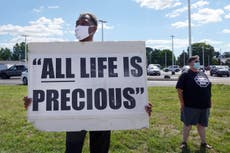Julius Jones files last-minute bid to avoid execution in Oklahoma
If the appeal is unsuccessful, Jones will be executed in November
Julius Jones, a death row inmate who has been fighting what he says is a wrongful murder conviction for the last two decades, made a final written appeal to Oklahoma authorities on Friday ahead of his scheduled November execution.
The police investigation and subsequent prosecution that put him behind bars was “fundamentally flawed,” according to a clemency petition sent to Oklahoma governor Kevin Stitt and the state Pardon and Parole Board, which voted last month to recommend commuting Jones’s sentence to life in prison with the possibility of parole.
“We hope the additional evidence presented in these clemency proceedings will reinforce the Board’s initial vote to recommend commuting Julius’s death sentence and that Governor Stitt will exercise his authority to ensure Oklahoma does not execute an innocent man,” Amanda Bass, Jones’s attorney, said in a statement accompanying the petition.
Governor Stitt has said he won’t render a final decision in this appeal until after Jones’s clemency hearing on 26 October. If the governor declines to intervene in the case, Jones has exhausted his legal remedies and will be executed on 18 November, following a September decision from an Oklahoma appeals court.
The entire process that led up to young Black man’s conviction for the sensational 1999 murder of white Oklahoma City businessman Paul Howell was flawed, Jones’s attorneys argue, from a police investigation that quickly deemed him a suspect to a trial process tarred as racially biased and prosecutorially improper.
“Because of fundamental breakdowns in the system tasked with deciding Julius’s guilt, the jurors who voted to convict and sentence Julius to die did so based on a fundamentally flawed and incomplete record that left them without powerful evidence of Julius’s innocence,” the petition reads. “Had that evidence been presented, we know from the sworn affidavits of three jurors who served on Julius’s jury that it could have made the critical difference.”
The public defenders representing Jones now argue the original jury didn’t hear key evidence. Key issues, they suggest, include that the jury was unaware the state’s case was built on evidence from two men with criminal histories and a record of being informants for Oklahoma police, who were promised or expected benefits for their testimony.
The petition also argues the incompetent team of original public defenders for Jones didn’t call a single witness in his defence, including family members who said Jones was at home at the time of the murder, or notify jurors that an inmate said he had heard a different man named Chris Jordan confess to the crime, which he denies.
One jury member came forward after the trial and said that a colleague had made racist remarks about the case, saying authorities “need to take this n***** and shoot him, and take him and bury him underneath the jail,” but was still allowed to vote on the final conviction.
After languishing for years, Jones’s case has in recent years inspired a “Justice for Julius” movement, and a growing number of community members, activists, and Hollywood figures Kim Kardashian and actress Viola Davis, who produced a documentary about his story, have called for his released.
“People should care because we’re living in the era of George Floyd,” Cece Jones-Davis, a leader of the Justice for Julius movement, told The Independent. “We saw in horror what happened to that man, how the system had its knee on George Floyd’s neck. We see now that the system has its knee on another man’s neck.”
Mr Howell’s family, as a well as a host of current and former Oklahoma law enforcement officials, maintain that Jones is the correct person to be convicted of the crime, pointing to factors like Jones’s DNA found on a bandanna wrapped around the murder weapon, as well as his previous criminal background.
They also resent the growing celebrity and media attention paid to the case.
“These celebrities and influencers don’t bother to reach out to us about it. I think the thing that is most frustrating about all this is you influence your followers. If you’re a celebrity, an influencer, an athlete, you have a lot of followers who look up to you,” Rachel Howell, Paul’s daughter, told Oklahoma’s KFOR, the day Julius was recommended for commutation. “I think the only thing I want these celebrities to know is to think about the victim’s family. Take the time to at least look at both sides. You don’t have all the information.”
“This is David versus Goliath,” Clayton Howell, Paul Howell’s nephew, added.
They said they were “devastated” by the commutation recommendation, calling the legal process “in no way fair.”
If the clemency process isn’t successful, Jones will be among the first men executed by the state of Oklahoma, after a six-year pause following a series of botched executions.
The Independent and the nonprofit Responsible Business Initiative for Justice (RBIJ) have launched a joint campaign calling for an end to death penalty in the US. The RBIJ has attracted more than 150 well-known signatories to their Business Leaders Declaration Against the Death Penalty - with The Independent as the latest on the list. We join high-profile executives like Ariana Huffington, Facebook’s Sheryl Sandberg, and Virgin Group founder Sir Richard Branson as part of this initiative and are making a pledge to highlight the injustices of the death penalty in our coverage.
Subscribe to Independent Premium to bookmark this article
Want to bookmark your favourite articles and stories to read or reference later? Start your Independent Premium subscription today.







Join our commenting forum
Join thought-provoking conversations, follow other Independent readers and see their replies
Comments